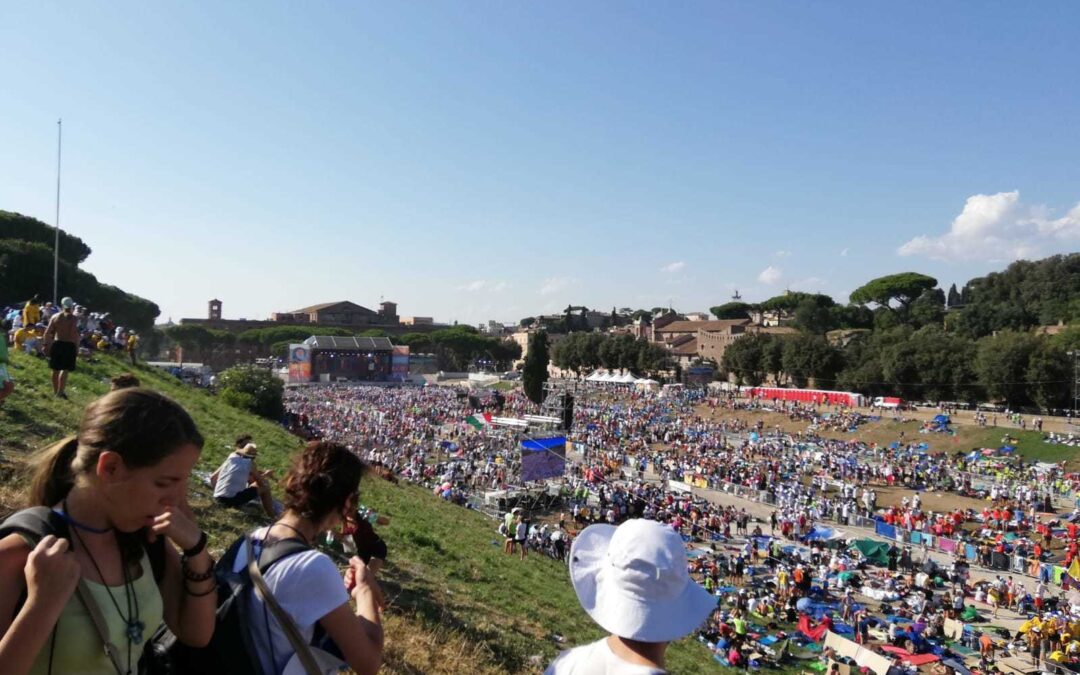
Aug 20, 2018 | Focolare Worldwide
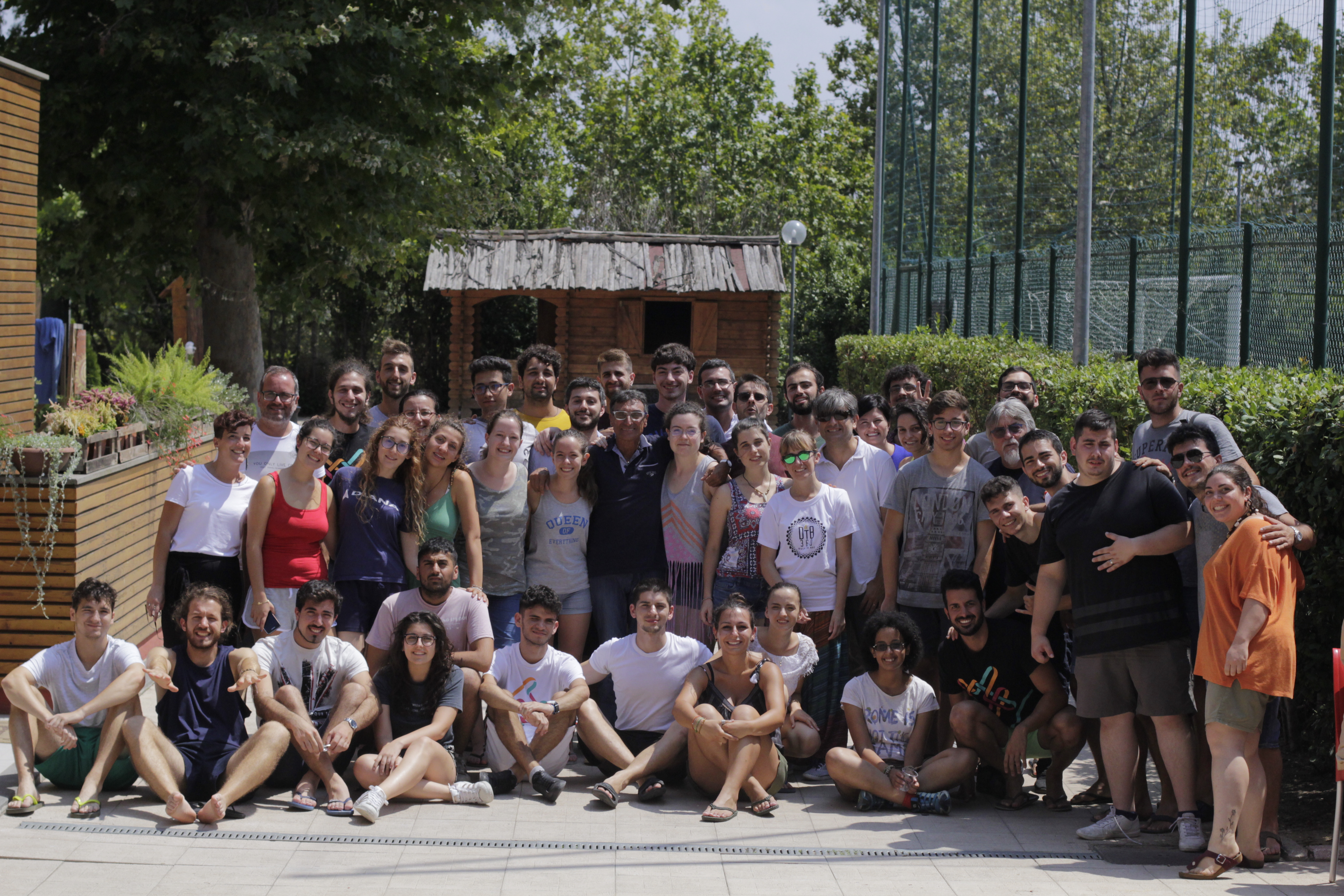 The Paper Mill, former factory at the periphery of Turin, northern Italy, thanks to a development process no longer looks like an abandoned facility. After which, it turned into a place of vitality and fresh air, thanks to the Turin Summer Campus organised by Youth for a United World, from 28 July to 6 August. A newly launched event, ideated to bring the outskirts towards the centre, and which saw an alternation of educational moments and concrete action. The strong point was the participation of the children of the zone, of different nationalities and cultures, who, with the youth of the Campus with simplicity and fun, created a recital, the outcome of the commitment and cooperation that arose during the artistic workshops (recycle-painting, music, theatre, dance, singing). A wealth of talents that upheld the cultural diversities in the neighbourhood, considered not as a motive for social discrimination, but for dialogue and exchange of ideas. Also the themes faced in the educational sessions triggered reflections which called the youths to become active citizens, opening debates on intercultural dialogue, end of life, “green” engineering. In Rome the Summer Campus 2018 was held in the spirit of fun and commitment. The activities proposed in the Corviale district – a kilometre-long building known as the “Snake” – were various types of music workshops, murals and clay activities for the kids, and discussions on current issues, with the participation of experts, to reflect on the daily news and challenges: the peripheries, “grassroots” lawfulness, acceptance of the migrants from the social and juridical standpoints, participation in political life, the uselessness of war and media manipulation, origin and cause of new conflicts.
The Paper Mill, former factory at the periphery of Turin, northern Italy, thanks to a development process no longer looks like an abandoned facility. After which, it turned into a place of vitality and fresh air, thanks to the Turin Summer Campus organised by Youth for a United World, from 28 July to 6 August. A newly launched event, ideated to bring the outskirts towards the centre, and which saw an alternation of educational moments and concrete action. The strong point was the participation of the children of the zone, of different nationalities and cultures, who, with the youth of the Campus with simplicity and fun, created a recital, the outcome of the commitment and cooperation that arose during the artistic workshops (recycle-painting, music, theatre, dance, singing). A wealth of talents that upheld the cultural diversities in the neighbourhood, considered not as a motive for social discrimination, but for dialogue and exchange of ideas. Also the themes faced in the educational sessions triggered reflections which called the youths to become active citizens, opening debates on intercultural dialogue, end of life, “green” engineering. In Rome the Summer Campus 2018 was held in the spirit of fun and commitment. The activities proposed in the Corviale district – a kilometre-long building known as the “Snake” – were various types of music workshops, murals and clay activities for the kids, and discussions on current issues, with the participation of experts, to reflect on the daily news and challenges: the peripheries, “grassroots” lawfulness, acceptance of the migrants from the social and juridical standpoints, participation in political life, the uselessness of war and media manipulation, origin and cause of new conflicts. 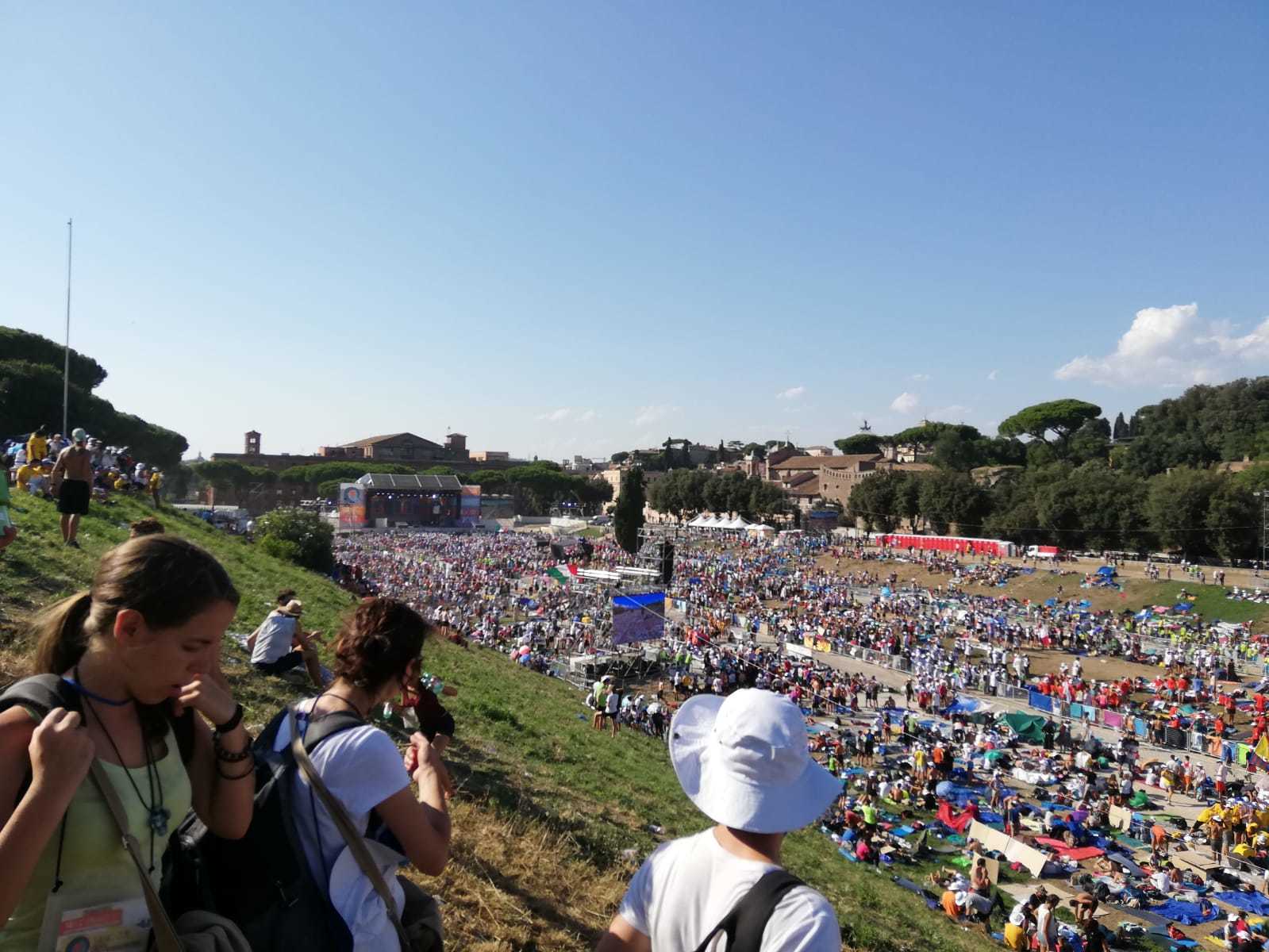 Besides the district associations, also some of the 8,000 families living in the “Snake” opened their doors and recounted their stories of suffering and hope. That which, at first glance seems to be an important building, and the end of which is invisible to the eye, seems to be a beehive of identical homes and windows, from inside is not scary: this is what the young people of the Campus felt, thanks to the encounter with people, countenances and stories which enabled all to go beyond the borders and prejudices, and above all the cement wall each carries within. The youth of the campus, children and families of Corviale worked together to prepare the final celebration in the district parish. It was an occasion to demonstrate the fruits of the workshops but also to build a chain between the realities, often diverging, of the territory and rediscover a sense of community and family. The main path of this campus which ended on 11 and 12 August, at Circo Massimo in Rome, with the meeting of the over 70,000 pilgrim youths from all over Italy, with Pope Francis, then in St. Peter’s, with the Mass and Angelus. The pope invited each one not to be “couch potato youths,” not to aspire tranquility, but take the risk of bravely pursuing their own dreams. The experiences lived in the peripheries of Turin and Rome were engines that pushed each campus participant to take the first steps along this path, challenging but necessary, to make their own dreams a reality.
Besides the district associations, also some of the 8,000 families living in the “Snake” opened their doors and recounted their stories of suffering and hope. That which, at first glance seems to be an important building, and the end of which is invisible to the eye, seems to be a beehive of identical homes and windows, from inside is not scary: this is what the young people of the Campus felt, thanks to the encounter with people, countenances and stories which enabled all to go beyond the borders and prejudices, and above all the cement wall each carries within. The youth of the campus, children and families of Corviale worked together to prepare the final celebration in the district parish. It was an occasion to demonstrate the fruits of the workshops but also to build a chain between the realities, often diverging, of the territory and rediscover a sense of community and family. The main path of this campus which ended on 11 and 12 August, at Circo Massimo in Rome, with the meeting of the over 70,000 pilgrim youths from all over Italy, with Pope Francis, then in St. Peter’s, with the Mass and Angelus. The pope invited each one not to be “couch potato youths,” not to aspire tranquility, but take the risk of bravely pursuing their own dreams. The experiences lived in the peripheries of Turin and Rome were engines that pushed each campus participant to take the first steps along this path, challenging but necessary, to make their own dreams a reality.
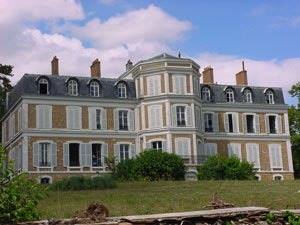
Aug 20, 2018 | Non categorizzato
 Website: http://www.focolari.fr/societe/cite-pilote/ Cité pilote d’Arny Facebook: https://www.facebook.com/citepilotedarny
Website: http://www.focolari.fr/societe/cite-pilote/ Cité pilote d’Arny Facebook: https://www.facebook.com/citepilotedarny
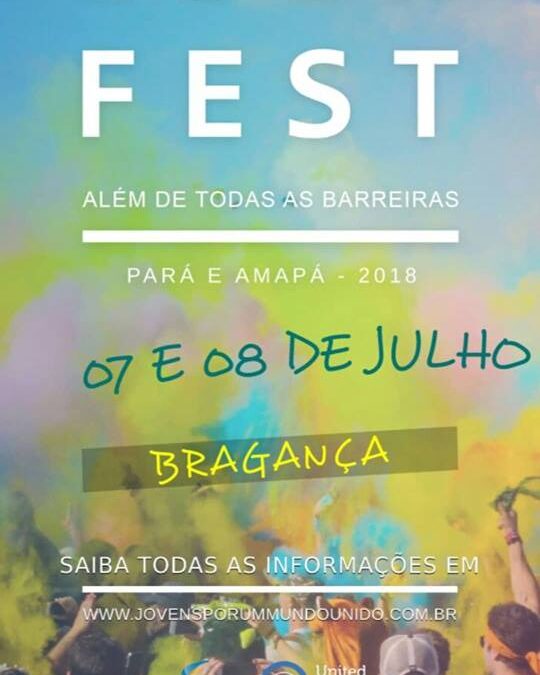
Aug 20, 2018 | Focolare Worldwide
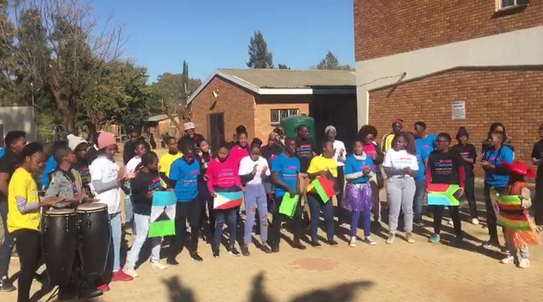 “This year we held our Youth Camp in Mafikeng, South Africa, precisely contemporaneously with the Genfest in the Philippines, with participants from Zimbabwe, Malawi, Zambia, Lesotho and South Africa. The presence of young people from various countries was in itself a visible sign of our desire to overcome the personal and cultural confines.” Mafikeng (Mafeking, up to 1980) is the capital, as well as a commercial centre of the North-west province, founded in 1885 as the British military outpost.It is currently an important stopover on the railway line from Cape City to Zimbabwe. “It was very interesting and funny to discover how our cultures differ and how we can still love one another in our diversities. I have learned many things -wrote Teddy, from Zambia –which I don’t want to keep to myself,but share with my brethren. The Youth Camp – says Nkosiphile from Zimbabwe – opened my eyes. I just can’t wait to put into practice all I have learned.”
“This year we held our Youth Camp in Mafikeng, South Africa, precisely contemporaneously with the Genfest in the Philippines, with participants from Zimbabwe, Malawi, Zambia, Lesotho and South Africa. The presence of young people from various countries was in itself a visible sign of our desire to overcome the personal and cultural confines.” Mafikeng (Mafeking, up to 1980) is the capital, as well as a commercial centre of the North-west province, founded in 1885 as the British military outpost.It is currently an important stopover on the railway line from Cape City to Zimbabwe. “It was very interesting and funny to discover how our cultures differ and how we can still love one another in our diversities. I have learned many things -wrote Teddy, from Zambia –which I don’t want to keep to myself,but share with my brethren. The Youth Camp – says Nkosiphile from Zimbabwe – opened my eyes. I just can’t wait to put into practice all I have learned.” 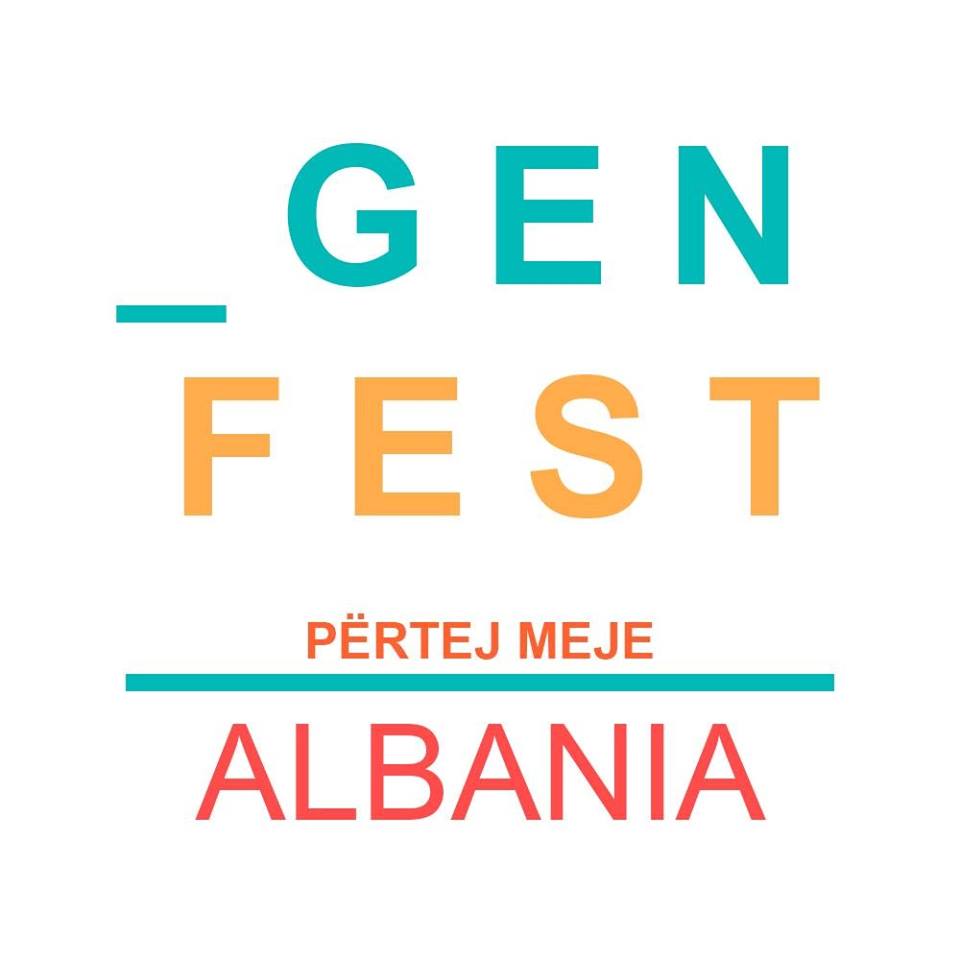 Simultaneously with the event in the Philippines, was also the one held in Albania, with about 120 participants consisting of Christians, Muslims, agnostics coming from various parts and cities of Albania, together with youths from Skopje (Macedonia) and a young girl from Stuttgart. “Like a weft, going from local to global realities, we held four workshops in the field of civil economy and culture of lawfulness, besides themes on prejudice, interpersonal relationships and the social networks, in the presence of Italian and Albanian experts. We visited the homes of disabled and homeless people, and got to meet some ecumenical and interreligious realities of the capital,
Simultaneously with the event in the Philippines, was also the one held in Albania, with about 120 participants consisting of Christians, Muslims, agnostics coming from various parts and cities of Albania, together with youths from Skopje (Macedonia) and a young girl from Stuttgart. “Like a weft, going from local to global realities, we held four workshops in the field of civil economy and culture of lawfulness, besides themes on prejudice, interpersonal relationships and the social networks, in the presence of Italian and Albanian experts. We visited the homes of disabled and homeless people, and got to meet some ecumenical and interreligious realities of the capital, 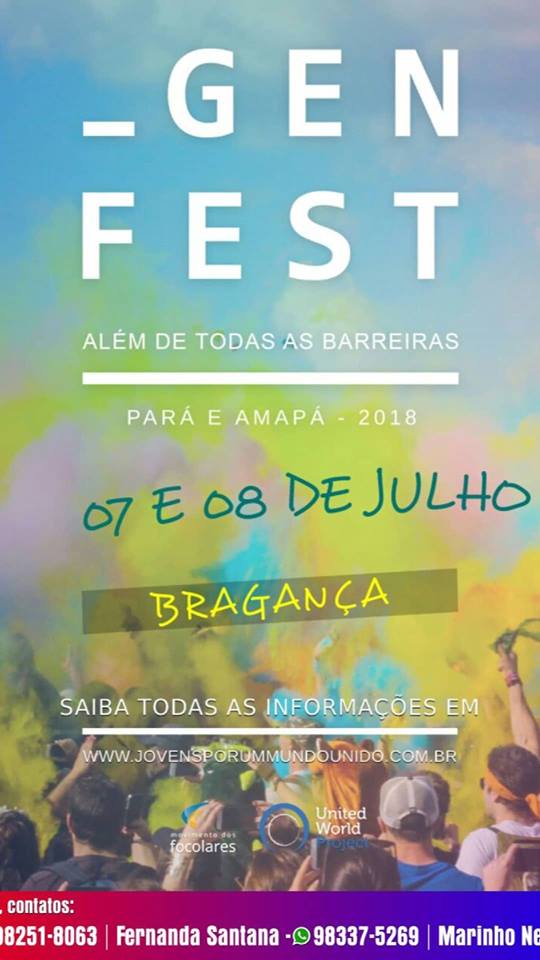 Tirana. The visits to the cathedral, accompanied by the bishop of the Orthodox Church of Albania, the Mosque and the National Centre of the evangelical Churches were followed by a “flash mob” of all the youths at Parku Rinjain the city centre. Genfest was accompanied by moments of celebrations and prayer, in a joyful atmosphere. It helped to connect the youths from the north and south of the country, and let them experience the international features of the new generations, who inherently tend to overcome all confines. A characteristic that stood out was that of working together with the Church in Albania in the preparation for the Synod of the youth, besides being an important step in reestablishing many relationships with Christians of other churches and Muslims, who now want to continue this path of dialogue.” Bragança, in the north-eastern part of Brazil, is the city where the Genfest was held for 300 young people from various cities of the State of Parà, which hosts a big section of the Amazon National Park. “For many of them – they wrote – it was the first contact with the Focolare communities. The programme consisted of some social projects in the city, like the Fazenda de la Esperança, a hospital, an ecumenical group, and other activities that helped us toenter into the real spiritof this event. So we illustrated the “Mundo Unido Project” and the proposal of Manila, “Paths of unity.” On the opposite bank of the Amazon River estuary in Macapà, there was another Genfest which gathered 140 young people. “It was a unique experience which we were able to concretise thanks to the support of all the members of the Focolare. Despite the difficulties, we believe that our objective, “beyond all borders,” has been reached.
Tirana. The visits to the cathedral, accompanied by the bishop of the Orthodox Church of Albania, the Mosque and the National Centre of the evangelical Churches were followed by a “flash mob” of all the youths at Parku Rinjain the city centre. Genfest was accompanied by moments of celebrations and prayer, in a joyful atmosphere. It helped to connect the youths from the north and south of the country, and let them experience the international features of the new generations, who inherently tend to overcome all confines. A characteristic that stood out was that of working together with the Church in Albania in the preparation for the Synod of the youth, besides being an important step in reestablishing many relationships with Christians of other churches and Muslims, who now want to continue this path of dialogue.” Bragança, in the north-eastern part of Brazil, is the city where the Genfest was held for 300 young people from various cities of the State of Parà, which hosts a big section of the Amazon National Park. “For many of them – they wrote – it was the first contact with the Focolare communities. The programme consisted of some social projects in the city, like the Fazenda de la Esperança, a hospital, an ecumenical group, and other activities that helped us toenter into the real spiritof this event. So we illustrated the “Mundo Unido Project” and the proposal of Manila, “Paths of unity.” On the opposite bank of the Amazon River estuary in Macapà, there was another Genfest which gathered 140 young people. “It was a unique experience which we were able to concretise thanks to the support of all the members of the Focolare. Despite the difficulties, we believe that our objective, “beyond all borders,” has been reached.
Aug 18, 2018 | Non categorizzato
The world renowned Italian tenor, active in various charitable commitments, will take centre stage in the “Festival of Families” in Croke Park Stadium (Dublin). The musical event will be held at the end of the World Meeting of Families with Pope Francis, from 21 to 26 August, on the theme “The Gospel of the family: joy for the world.” Andrea Bocelli who had said that “singing before the Pope is a privilege for the soul, also said: “It is a joy to be able to offer my modest contribution on the occasion of this grand meeting and moment of reflection on the family. The family remains the strongest building block of society, a cluster of affection and privileged space in which one can teach and learn – in every action – how to choose a life that leads to the greater good.”
Aug 18, 2018 | Non categorizzato
In 1994, in conjunction with the International Year dedicated by the United Nations to the Family, John Paul II announced the “World Meeting of Families”, which took place in Rome 8-9 October of the same year. Since then, the event has been repeated every three years. The past editions were held in Rio de Janeiro (Brazil) in 1997, in Rome in 2000 (during the Jubilee Year), in Manila (Philippines) in 2003, in Valencia (Spain) in 2006, in Mexico City in 2009, at Milan (Italy) in 2012 and finally in Philadelphia (USA) in 2015. A few days before ninth edition, which will take place in Dublin (Ireland) on August 25-26 2018, with the title “The Gospel of the family: joy for the world”, thousands of families from 196 countries of the world are preparing for the meeting with Pope Francis. Half a million people are expected to attend the Mass. Promoted by the new Dicastery for the Laity, the Family and Life, the event will be preceded by a three-day pastoral conference attended by 37,000 families.
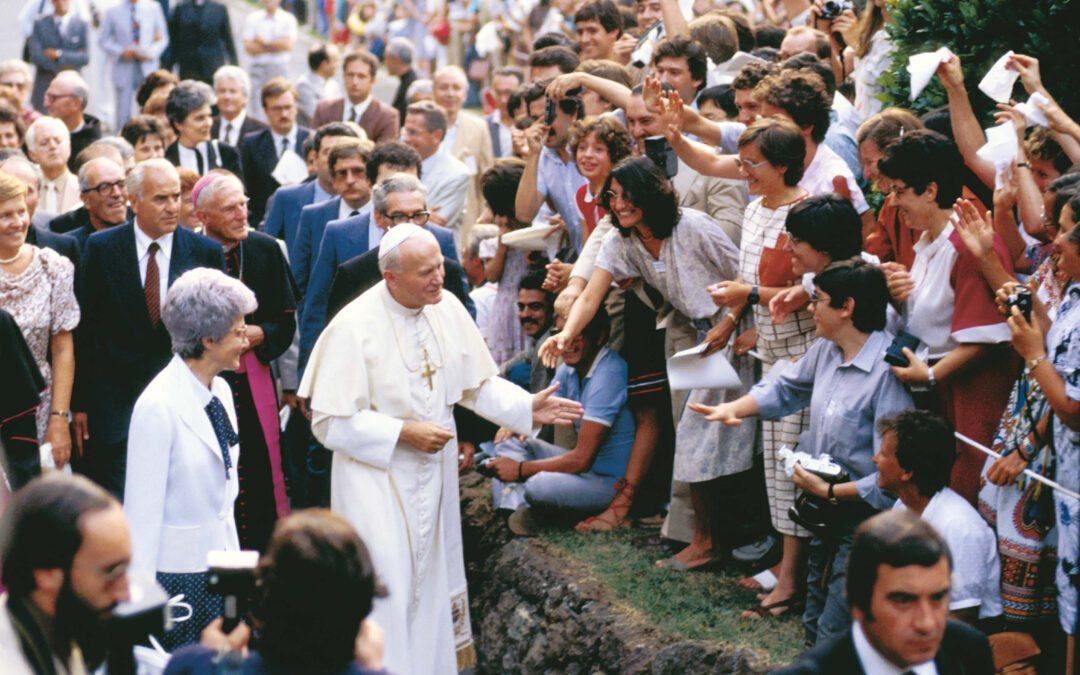
Aug 17, 2018 | Non categorizzato
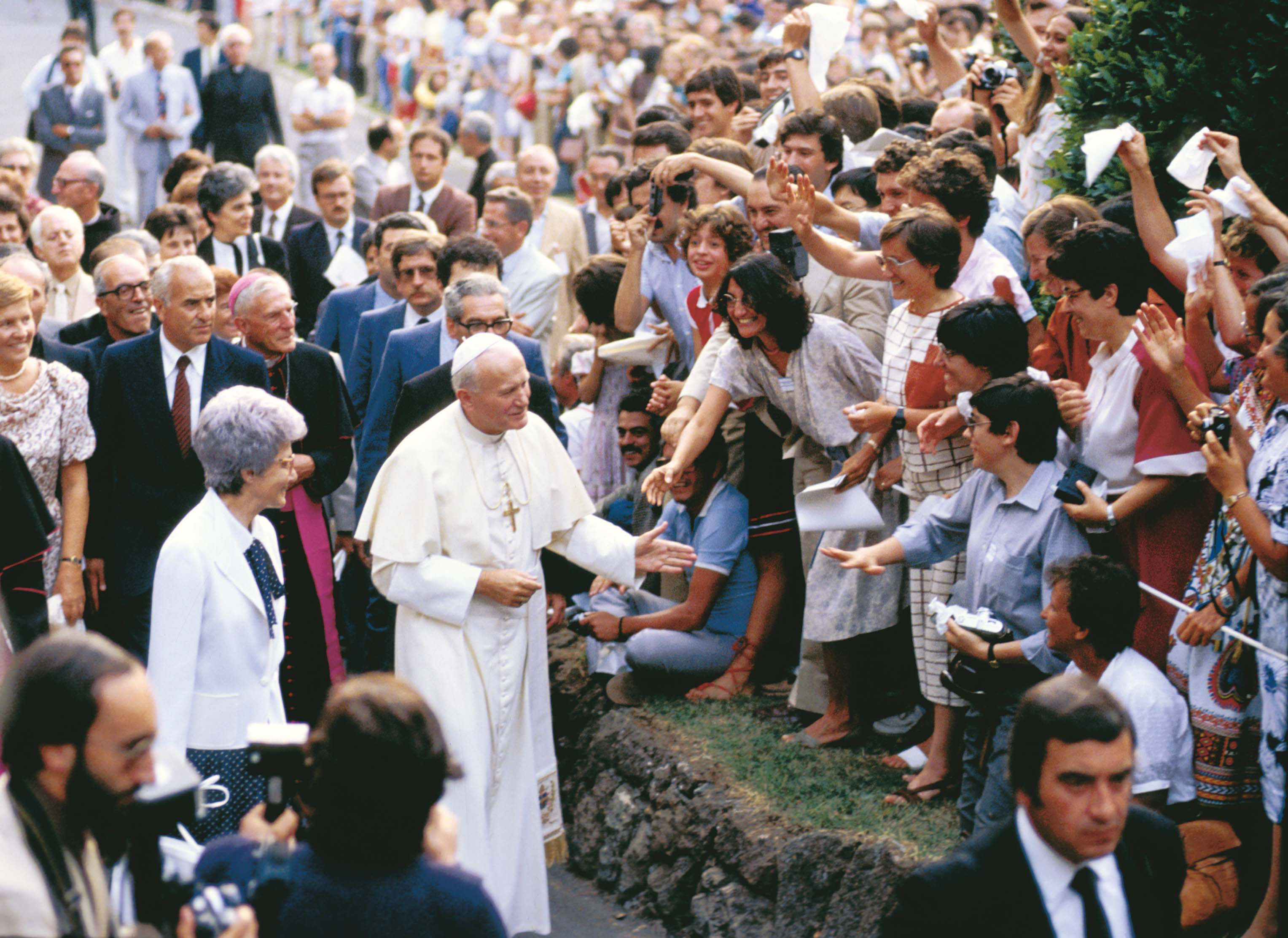
Photo © CSC Audiovisivi
Aug 17, 2018 | Non categorizzato
The celebration of the World Humanitarian Day, chosen by the UN Assembly in 2009 on the anniversary of the air raid of 19 August 2003, at the seat of the United Nations in Baghdad, is an occasion to pay tribute to the humanitarian operators who daily risk their lives worldwide to deliver their services in difficult and dangerous conditions. According to international law, this service is based on a series of principles, such as humaneness, impartiality, neutrality and independence. The operators are guaranteed access to countries affected by humanitarian crises, conflicts or climate disasters, to furnish immediate assistance, which for many, makes the difference between life and death, and through time a psycho-social support to rebuild the communities and maintain a durable and sustainable peace in the areas of conflict.
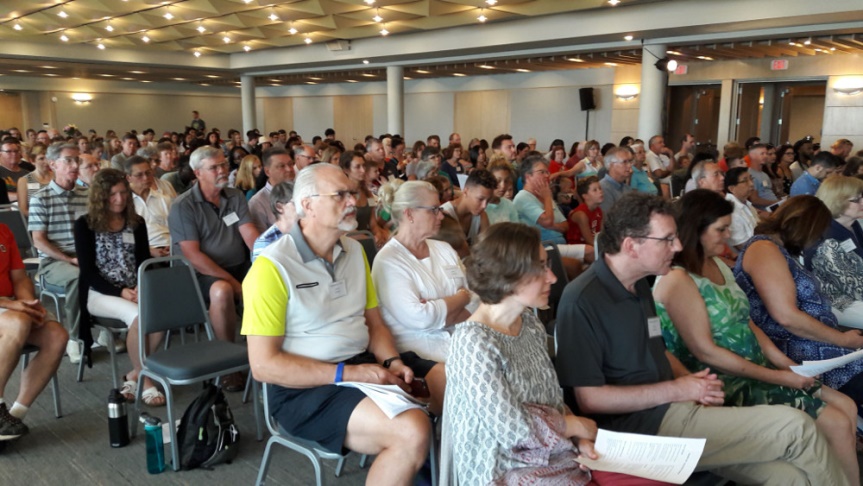
Aug 16, 2018 | Non categorizzato
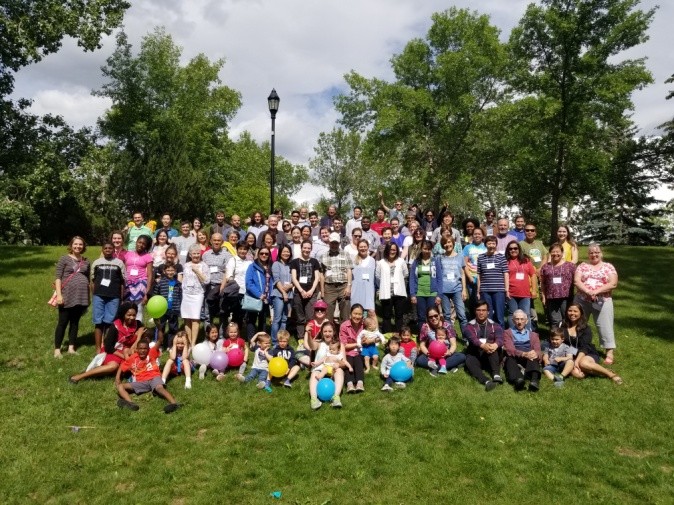 “Our Mariapolis in Calgary,” wrote Alizza and Norio from Canada, “was attended by about 120 people, particularly young people and families, mostly from the provinces of Alberta, Saskatchewan, but also from Manitoba and the British Columbia. The program included the presentation of Pope Francis’s Apostolic Exhortation on the call to sainthood today (“Gaudete et exsultate”), followed by an open dialogue. The presentation, prepared by Rev. A. Martens of the diocese of Calgary, aroused in all the desire to read it personally. Another novelty in the “city founded on faith,” as a participant defined, was the prayer for peace soiree. The community of Chicago wrote: “We are at the conclusion of our Mariapolis which was held for the entire Midwest community. Already last year, we had felt the need to change the location and style of our traditional event, which has been held up to now always in a university campus in the city. The choice fell on the pleasant banks of a lake.
“Our Mariapolis in Calgary,” wrote Alizza and Norio from Canada, “was attended by about 120 people, particularly young people and families, mostly from the provinces of Alberta, Saskatchewan, but also from Manitoba and the British Columbia. The program included the presentation of Pope Francis’s Apostolic Exhortation on the call to sainthood today (“Gaudete et exsultate”), followed by an open dialogue. The presentation, prepared by Rev. A. Martens of the diocese of Calgary, aroused in all the desire to read it personally. Another novelty in the “city founded on faith,” as a participant defined, was the prayer for peace soiree. The community of Chicago wrote: “We are at the conclusion of our Mariapolis which was held for the entire Midwest community. Already last year, we had felt the need to change the location and style of our traditional event, which has been held up to now always in a university campus in the city. The choice fell on the pleasant banks of a lake. 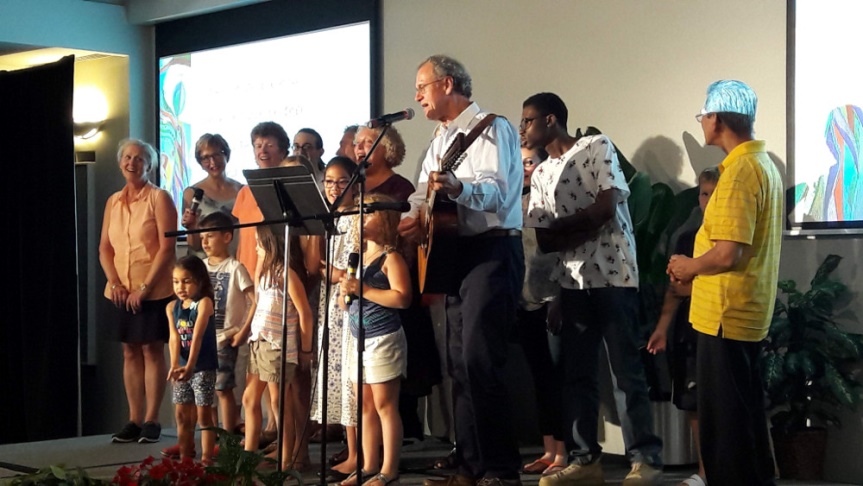 The program entitled: “Mary: her experience, our experience,” reminded us that no one is immune to the trials and uncertainties which Mary of Nazareth had undergone, and showed us how to face them. The results?“The atmosphere of the Mariapolis seemed like that of a family luncheon: relaxed, with a lot of flexibility, improvisation (which also meant having a good sense of humour) and an overall sense of peace.” “The themes focused on and the sharing of experiences helped me to understand Mary more deeply, in the difficult times in which she lived and the way in which she managed to overcome the trials. I liked the group which shared about ’knowing how to lose’. This type of mentality is not popular in today’s world.”
The program entitled: “Mary: her experience, our experience,” reminded us that no one is immune to the trials and uncertainties which Mary of Nazareth had undergone, and showed us how to face them. The results?“The atmosphere of the Mariapolis seemed like that of a family luncheon: relaxed, with a lot of flexibility, improvisation (which also meant having a good sense of humour) and an overall sense of peace.” “The themes focused on and the sharing of experiences helped me to understand Mary more deeply, in the difficult times in which she lived and the way in which she managed to overcome the trials. I liked the group which shared about ’knowing how to lose’. This type of mentality is not popular in today’s world.”  “Our Mariapolis was held in West Virginia, wrote the Focolare community of Washington DC, with 160 participants. The youth, who made up more than half of the participants,from being guests turned into protagonists and placed their numberless talents in the technical field at the service of the reception and management of the groups.” In Tennessee, USA, around 70 participants were from various southeastern States: Maryland, Georgia, Tennessee, Arkansas, Alabama, Florida, and Texas, besides those from Indiana and New York. “We dedicated much time to building relationships, and even watched some soccer world championship matches… The presence of the little ones was a gift, and they were always among the first one to recount their concrete acts of love. We delved deeper into Mary’s ‘yes’, and her “bring Jesus to the world.”During the final closing program, a boy who was accommodated in the same centre wanted to give his share of experiences. A Father said: “I was struck by the love of my son, who is 7. While I was busy preparing the final program, he went to fetch dinner for me.”And a child: “Why don’t we stay for a whole month?” From Bulgaria, a letter full of photos arrived: “It is the second time we are holding the Mariapolis in the central Balkan region, with about 80 people from 1 to 85 years of age. Before it started in the next-door Orthodox Monastery, there was a feast dedicated to Our Lady. Upon meeting us there, the Abbot insisted on meeting all the Mariapolis attendants on the next Sunday. We were a sole family: Catholics, Orthodox and Protestants (Baptists).” In Bolivia the Mariapolis, characterized by the numerous presence of young people, concluded with the young people’s Genfest. “The great mutual love between adults and the youth enabled the success of the two events. In the Mariapolis we held workshops on ecology, the economy of communion, dialogue and even choreographed dances and games for the last day’s Genfest, a great occasion to go well beyond our limits as the title of the event said, and to speak of God to many young people!”
“Our Mariapolis was held in West Virginia, wrote the Focolare community of Washington DC, with 160 participants. The youth, who made up more than half of the participants,from being guests turned into protagonists and placed their numberless talents in the technical field at the service of the reception and management of the groups.” In Tennessee, USA, around 70 participants were from various southeastern States: Maryland, Georgia, Tennessee, Arkansas, Alabama, Florida, and Texas, besides those from Indiana and New York. “We dedicated much time to building relationships, and even watched some soccer world championship matches… The presence of the little ones was a gift, and they were always among the first one to recount their concrete acts of love. We delved deeper into Mary’s ‘yes’, and her “bring Jesus to the world.”During the final closing program, a boy who was accommodated in the same centre wanted to give his share of experiences. A Father said: “I was struck by the love of my son, who is 7. While I was busy preparing the final program, he went to fetch dinner for me.”And a child: “Why don’t we stay for a whole month?” From Bulgaria, a letter full of photos arrived: “It is the second time we are holding the Mariapolis in the central Balkan region, with about 80 people from 1 to 85 years of age. Before it started in the next-door Orthodox Monastery, there was a feast dedicated to Our Lady. Upon meeting us there, the Abbot insisted on meeting all the Mariapolis attendants on the next Sunday. We were a sole family: Catholics, Orthodox and Protestants (Baptists).” In Bolivia the Mariapolis, characterized by the numerous presence of young people, concluded with the young people’s Genfest. “The great mutual love between adults and the youth enabled the success of the two events. In the Mariapolis we held workshops on ecology, the economy of communion, dialogue and even choreographed dances and games for the last day’s Genfest, a great occasion to go well beyond our limits as the title of the event said, and to speak of God to many young people!”
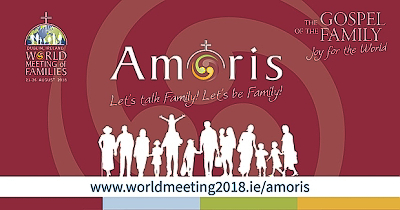
Aug 15, 2018 | Focolare Worldwide
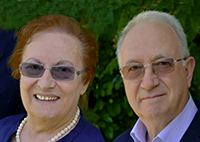 They attended all the World Meetings of Families, since the one held in Rome in1994. And at this year’s gathering in Dublin, they will share their testimony at the Pastoral Congress. They are Anna and Alberto Friso, once responsible for New Families, a branch of the Focolare Movement. They speak to Vatican news about the challenges faced by Christian families in today’s world, and of their expectations for the Meeting in Dublin which will have as its main theme Pope Francis’s apostolic exhortation Amoris laetitia (The Joy of Love). You paricipated as a family in all the World Meetings – a full quarter of a century! What has changed over the past 25 years for Christian families, in your opinion? Anna: The accent put on the new generations, the fact of no longer believing in “forever.” The challenge we must embrace is to get young people to perceive that love is an essential component of life and that it is a wellspring of happiness that married people bring. Turning to marriage doesn’t mean losing your freedom, but obtaining the possibility of a happy life! Alberto: Two things in particular characterize today’s society: individualism and relativism. There seems to be a lack of coesion in front of these two tendencies, the unity of the couple. This has meant that we Christians, we Christian families have to look deeper into God’s plan to see in what way He has called us to live in his image and likeness. As a family that has given such a long witness of Christian living, what would you feel like saying to a young couple that is stepping into marriage concerning eternal love? Alberto: What we feel like saying is: Keep in mind that the love between you that you felt in the first moments you felt these sentiments growing, is of extraordinary importance – eternal! It’s a spark of the deep value that will lie at the basis of your life, for the rest of your life, even when the storms come, and, it’s God’s love. Therefore, it’s not the two of you that get married, but the three of you, because Jesus will be with you! And, thank God, this means answers. The young people themselves become testimonies of this! Anna: The challenge is to not allow yourself be challenged by the dominating culture that focuses on feelings, personal rights that prevail over the other’s rights, or even over the value of the couple itself. God’s plan for marriage has this seal of happiness that it is possible bring to fulfillment precisely because it’s a very part of the person’s destiny, part of the DNA of every human being!
They attended all the World Meetings of Families, since the one held in Rome in1994. And at this year’s gathering in Dublin, they will share their testimony at the Pastoral Congress. They are Anna and Alberto Friso, once responsible for New Families, a branch of the Focolare Movement. They speak to Vatican news about the challenges faced by Christian families in today’s world, and of their expectations for the Meeting in Dublin which will have as its main theme Pope Francis’s apostolic exhortation Amoris laetitia (The Joy of Love). You paricipated as a family in all the World Meetings – a full quarter of a century! What has changed over the past 25 years for Christian families, in your opinion? Anna: The accent put on the new generations, the fact of no longer believing in “forever.” The challenge we must embrace is to get young people to perceive that love is an essential component of life and that it is a wellspring of happiness that married people bring. Turning to marriage doesn’t mean losing your freedom, but obtaining the possibility of a happy life! Alberto: Two things in particular characterize today’s society: individualism and relativism. There seems to be a lack of coesion in front of these two tendencies, the unity of the couple. This has meant that we Christians, we Christian families have to look deeper into God’s plan to see in what way He has called us to live in his image and likeness. As a family that has given such a long witness of Christian living, what would you feel like saying to a young couple that is stepping into marriage concerning eternal love? Alberto: What we feel like saying is: Keep in mind that the love between you that you felt in the first moments you felt these sentiments growing, is of extraordinary importance – eternal! It’s a spark of the deep value that will lie at the basis of your life, for the rest of your life, even when the storms come, and, it’s God’s love. Therefore, it’s not the two of you that get married, but the three of you, because Jesus will be with you! And, thank God, this means answers. The young people themselves become testimonies of this! Anna: The challenge is to not allow yourself be challenged by the dominating culture that focuses on feelings, personal rights that prevail over the other’s rights, or even over the value of the couple itself. God’s plan for marriage has this seal of happiness that it is possible bring to fulfillment precisely because it’s a very part of the person’s destiny, part of the DNA of every human being!  In Dublin, The Joy of Love will obviously play an important role. What is this post-synodal exhortation giving to Christian families, and not only Christian? Alberto: Most particularly, it urges us to give witness to Christianity especially through the way we live, the way we give witness to God’s love. When it comes to the world, it’s not so much that we have to defend a ideas, ways of thinking, or a particular value; we have to give witness to the fact that God is Love and that love lies in the depths of the human heart, even hearts that are going through the darkest crises. Anna: We’ve experienced this so so much, precisely because of its luminosity and also its concreteness that doesn’t come to terms with the doctrine, but is able to comprehend and give a hand to those who have been wounded by life. And to these people, most especially, it is able to offer the hope of finding a way to happiness even in the midst of problems. Its beauty lies in its being a hymn to love. Inside this document we can see all of the Church’s tenderness. I believe that it is really a gift for new generations of newlyweds. Source: Vatican News, August 10, 2018
In Dublin, The Joy of Love will obviously play an important role. What is this post-synodal exhortation giving to Christian families, and not only Christian? Alberto: Most particularly, it urges us to give witness to Christianity especially through the way we live, the way we give witness to God’s love. When it comes to the world, it’s not so much that we have to defend a ideas, ways of thinking, or a particular value; we have to give witness to the fact that God is Love and that love lies in the depths of the human heart, even hearts that are going through the darkest crises. Anna: We’ve experienced this so so much, precisely because of its luminosity and also its concreteness that doesn’t come to terms with the doctrine, but is able to comprehend and give a hand to those who have been wounded by life. And to these people, most especially, it is able to offer the hope of finding a way to happiness even in the midst of problems. Its beauty lies in its being a hymn to love. Inside this document we can see all of the Church’s tenderness. I believe that it is really a gift for new generations of newlyweds. Source: Vatican News, August 10, 2018
Aug 14, 2018 | Non categorizzato
«Mary is not easily understood even though she is greatly loved. In a heart that is far from God, one is more likely to find devotion to her than to Jesus. She is universally loved. And the reason is this: it is Mary’s nature to be Mother. Mothers, in general, are not “understood,” especially by younger children; they are “loved.” And not infrequently, indeed often, one hears that an eighty-year-old man dies saying as his last word: “mother.” A mother is more the object of the heart’s intuition than of the mind’s speculation. She is more poetry than philosophy, because she is too real and profound, close to the human heart. So it is with Mary, the Mother of mothers, who the sum of all the affection, goodness, and mercy of all the mothers in the world cannot manage to equal. Jesus, in a certain sense, confronts us more: his divine and splendid works are too different from ours to be confused with them. Indeed they are a sign of contradiction. Mary is peaceful like nature, pure, serene, clear, temperate, beautiful — that nature which is distant from the world, in the mountains, in the open countryside, by the sea, in the blue sky or the starry heavens. She is strong, vigorous, harmonious, consistent, unyielding, rich in hope, for in nature it is life that springs up perennially generous, adorned with the fragrant beauty of flowers, kind in the abundance of its fruits. Mary is too simple and too close to us to be “contemplated.” She is “sung” by hearts that are pure and in love, who express like this what is best in them. She brings the divine to earth as gently as a heavenly plane sloping from the dizzy heights of heaven to the infinite smallness of creatures. She is the Mother of all and of each human being, who alone knows how to burble and smile at her child in such a way that, even though it is small, each knows how to enjoy her caress and respond with its love to that love. Mary is not understood because she is too close to us. She, who was destined from eternity to bring graces, the divine jewels of her Son, to humanity, is there, near to us, and waits, always hoping for us to notice her gaze and accept her gifts. If any are fortunate enough to understand her, she carries them off to her kingdom of peace, where Jesus is King, and the Holy Spirit is the life-breath of that heaven. There, purified of our dross and illuminated in our darkness, we will contemplate her and enjoy her, an added paradise, a paradise apart. Here, let us be found worthy of being called along “her way” to avoid staying always immature in spirit, with a love that does not go beyond supplication, petition, request and self-interest, but knowing her a little, may we glorify her.» Source: Centro Chiara Lubich

 The Paper Mill, former factory at the periphery of Turin, northern Italy, thanks to a development process no longer looks like an abandoned facility. After which, it turned into a place of vitality and fresh air, thanks to the Turin Summer Campus organised by Youth for a United World, from 28 July to 6 August. A newly launched event, ideated to bring the outskirts towards the centre, and which saw an alternation of educational moments and concrete action. The strong point was the participation of the children of the zone, of different nationalities and cultures, who, with the youth of the Campus with simplicity and fun, created a recital, the outcome of the commitment and cooperation that arose during the artistic workshops (recycle-painting, music, theatre, dance, singing). A wealth of talents that upheld the cultural diversities in the neighbourhood, considered not as a motive for social discrimination, but for dialogue and exchange of ideas. Also the themes faced in the educational sessions triggered reflections which called the youths to become active citizens, opening debates on intercultural dialogue, end of life, “green” engineering. In Rome the Summer Campus 2018 was held in the spirit of fun and commitment. The activities proposed in the Corviale district – a kilometre-long building known as the “Snake” – were various types of music workshops, murals and clay activities for the kids, and discussions on current issues, with the participation of experts, to reflect on the daily news and challenges: the peripheries, “grassroots” lawfulness, acceptance of the migrants from the social and juridical standpoints, participation in political life, the uselessness of war and media manipulation, origin and cause of new conflicts.
The Paper Mill, former factory at the periphery of Turin, northern Italy, thanks to a development process no longer looks like an abandoned facility. After which, it turned into a place of vitality and fresh air, thanks to the Turin Summer Campus organised by Youth for a United World, from 28 July to 6 August. A newly launched event, ideated to bring the outskirts towards the centre, and which saw an alternation of educational moments and concrete action. The strong point was the participation of the children of the zone, of different nationalities and cultures, who, with the youth of the Campus with simplicity and fun, created a recital, the outcome of the commitment and cooperation that arose during the artistic workshops (recycle-painting, music, theatre, dance, singing). A wealth of talents that upheld the cultural diversities in the neighbourhood, considered not as a motive for social discrimination, but for dialogue and exchange of ideas. Also the themes faced in the educational sessions triggered reflections which called the youths to become active citizens, opening debates on intercultural dialogue, end of life, “green” engineering. In Rome the Summer Campus 2018 was held in the spirit of fun and commitment. The activities proposed in the Corviale district – a kilometre-long building known as the “Snake” – were various types of music workshops, murals and clay activities for the kids, and discussions on current issues, with the participation of experts, to reflect on the daily news and challenges: the peripheries, “grassroots” lawfulness, acceptance of the migrants from the social and juridical standpoints, participation in political life, the uselessness of war and media manipulation, origin and cause of new conflicts.  Besides the district associations, also some of the 8,000 families living in the “Snake” opened their doors and recounted their stories of suffering and hope. That which, at first glance seems to be an important building, and the end of which is invisible to the eye, seems to be a beehive of identical homes and windows, from inside is not scary: this is what the young people of the Campus felt, thanks to the encounter with people, countenances and stories which enabled all to go beyond the borders and prejudices, and above all the cement wall each carries within. The youth of the campus, children and families of Corviale worked together to prepare the final celebration in the district parish. It was an occasion to demonstrate the fruits of the workshops but also to build a chain between the realities, often diverging, of the territory and rediscover a sense of community and family. The main path of this campus which ended on 11 and 12 August, at Circo Massimo in Rome, with the meeting of the over 70,000 pilgrim youths from all over Italy, with Pope Francis, then in St. Peter’s, with the Mass and Angelus. The pope invited each one not to be “couch potato youths,” not to aspire tranquility, but take the risk of bravely pursuing their own dreams. The experiences lived in the peripheries of Turin and Rome were engines that pushed each campus participant to take the first steps along this path, challenging but necessary, to make their own dreams a reality.
Besides the district associations, also some of the 8,000 families living in the “Snake” opened their doors and recounted their stories of suffering and hope. That which, at first glance seems to be an important building, and the end of which is invisible to the eye, seems to be a beehive of identical homes and windows, from inside is not scary: this is what the young people of the Campus felt, thanks to the encounter with people, countenances and stories which enabled all to go beyond the borders and prejudices, and above all the cement wall each carries within. The youth of the campus, children and families of Corviale worked together to prepare the final celebration in the district parish. It was an occasion to demonstrate the fruits of the workshops but also to build a chain between the realities, often diverging, of the territory and rediscover a sense of community and family. The main path of this campus which ended on 11 and 12 August, at Circo Massimo in Rome, with the meeting of the over 70,000 pilgrim youths from all over Italy, with Pope Francis, then in St. Peter’s, with the Mass and Angelus. The pope invited each one not to be “couch potato youths,” not to aspire tranquility, but take the risk of bravely pursuing their own dreams. The experiences lived in the peripheries of Turin and Rome were engines that pushed each campus participant to take the first steps along this path, challenging but necessary, to make their own dreams a reality.



 Simultaneously with the event in the Philippines, was also the one held in Albania, with about 120 participants consisting of Christians, Muslims, agnostics coming from various parts and cities of Albania, together with youths from Skopje (Macedonia) and a young girl from Stuttgart. “Like a weft, going from local to global realities, we held four workshops in the field of civil economy and culture of lawfulness, besides themes on prejudice, interpersonal relationships and the social networks, in the presence of Italian and Albanian experts. We visited the homes of disabled and homeless people, and got to meet some ecumenical and interreligious realities of the capital,
Simultaneously with the event in the Philippines, was also the one held in Albania, with about 120 participants consisting of Christians, Muslims, agnostics coming from various parts and cities of Albania, together with youths from Skopje (Macedonia) and a young girl from Stuttgart. “Like a weft, going from local to global realities, we held four workshops in the field of civil economy and culture of lawfulness, besides themes on prejudice, interpersonal relationships and the social networks, in the presence of Italian and Albanian experts. We visited the homes of disabled and homeless people, and got to meet some ecumenical and interreligious realities of the capital, 






 They attended all the World Meetings of Families, since the one held in Rome in1994. And at this year’s gathering in Dublin, they will share their testimony at the Pastoral Congress. They are Anna and Alberto Friso, once responsible for New Families, a branch of the Focolare Movement. They speak to Vatican news about the challenges faced by Christian families in today’s world, and of their expectations for the Meeting in Dublin which will have as its main theme Pope Francis’s
They attended all the World Meetings of Families, since the one held in Rome in1994. And at this year’s gathering in Dublin, they will share their testimony at the Pastoral Congress. They are Anna and Alberto Friso, once responsible for New Families, a branch of the Focolare Movement. They speak to Vatican news about the challenges faced by Christian families in today’s world, and of their expectations for the Meeting in Dublin which will have as its main theme Pope Francis’s